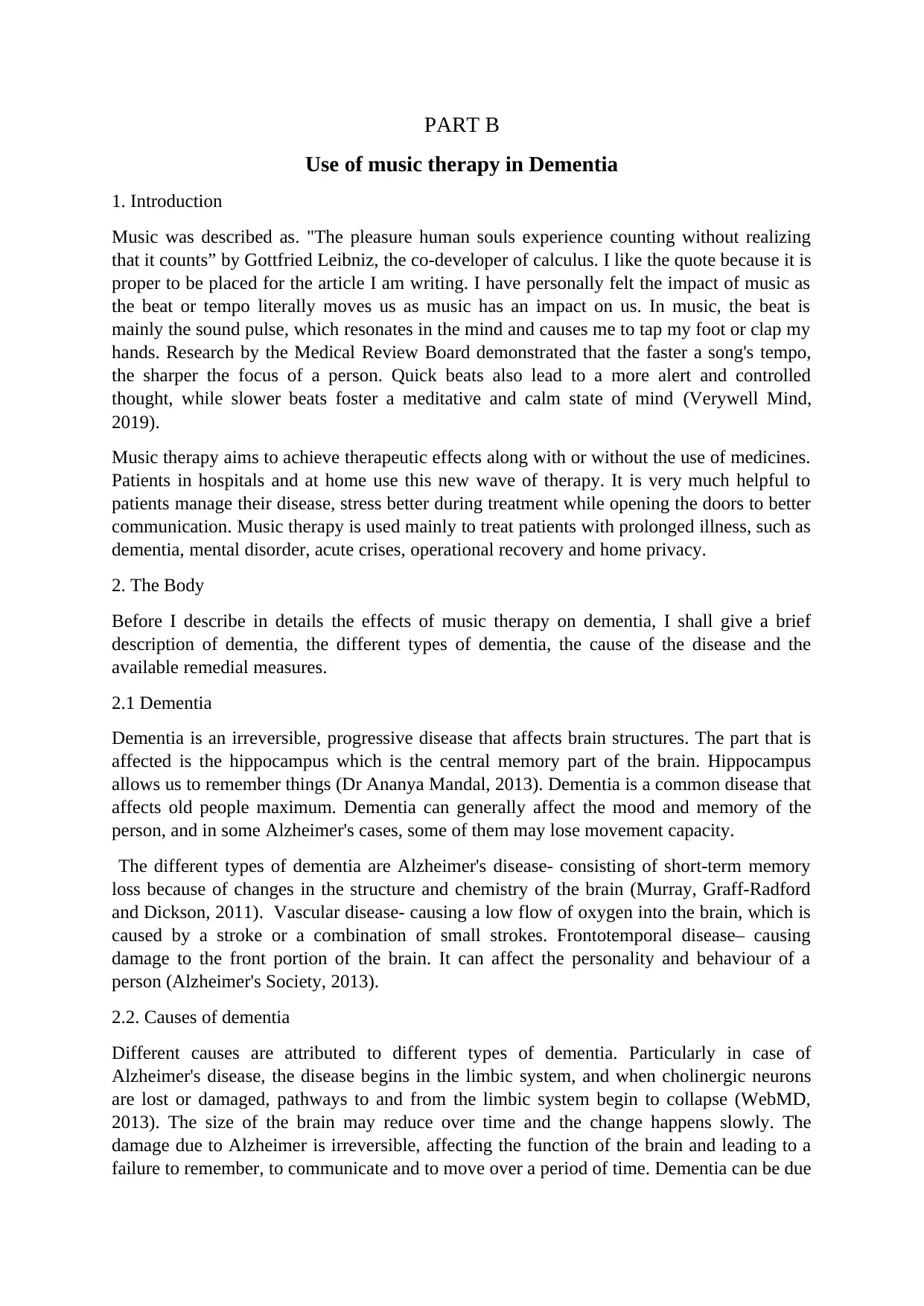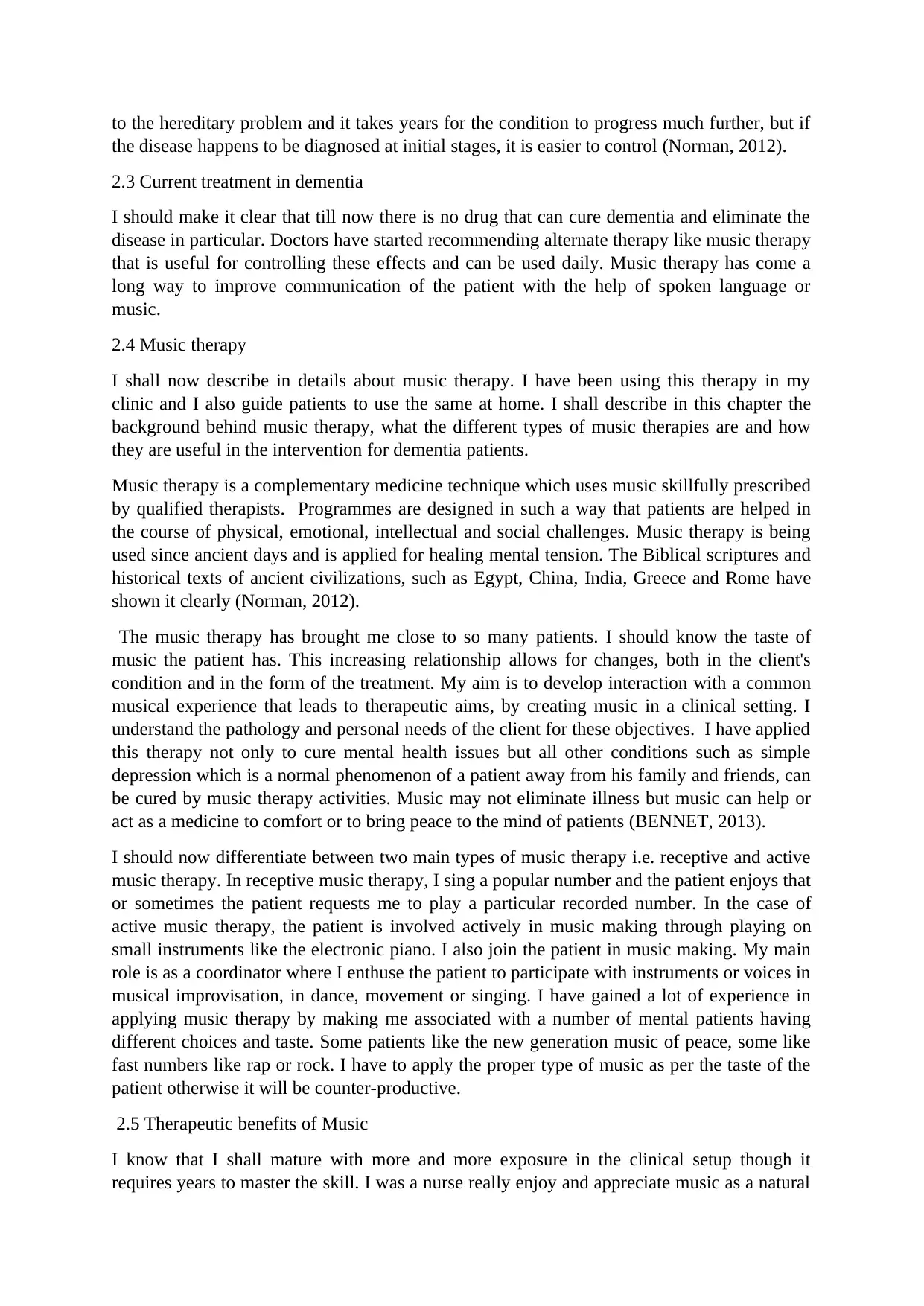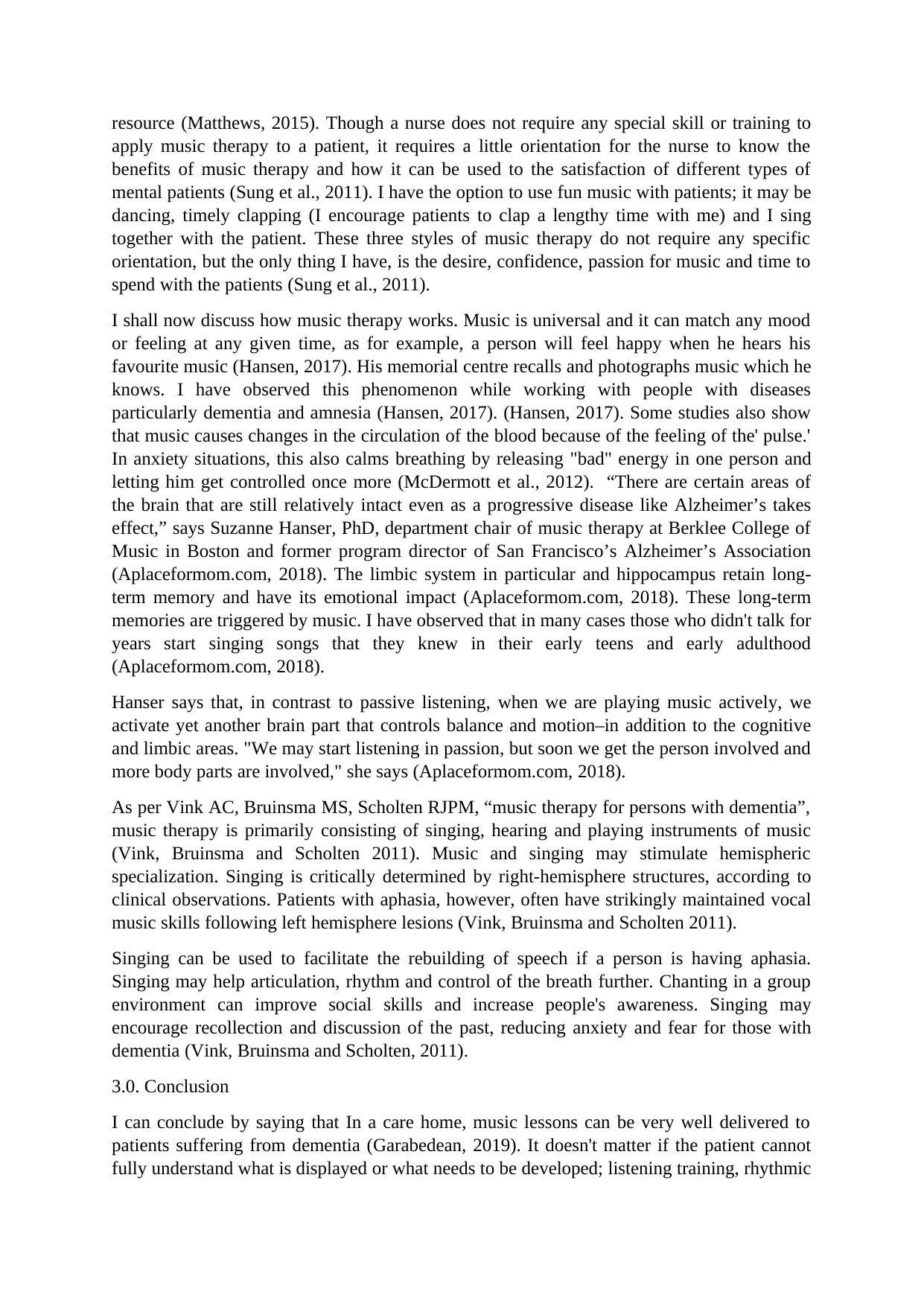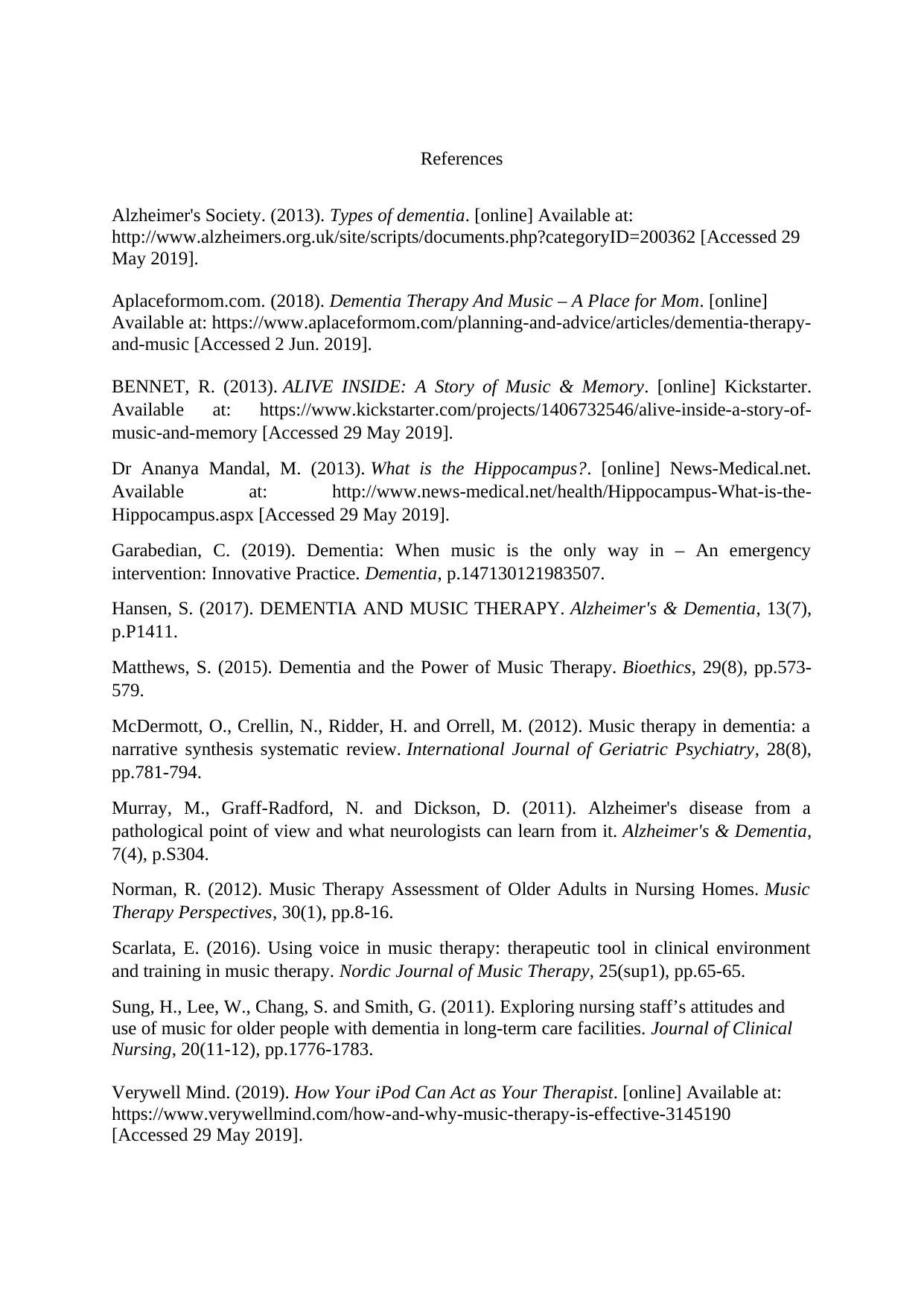Use of Music Therapy in Dementia - Benefits and Types
VerifiedAdded on 2022/11/18
|6
|2514
|174
AI Summary
This article discusses the use of music therapy in dementia patients. It explains what dementia is, the different types of dementia, the causes of the disease, and the available remedial measures. The article also describes music therapy, its different types, and how it can be useful in the intervention for dementia patients. It concludes by discussing the benefits of music therapy and how it can help improve communication, reduce anxiety and fear, and stimulate hemispheric specialization.
Contribute Materials
Your contribution can guide someone’s learning journey. Share your
documents today.

PART B
Use of music therapy in Dementia
1. Introduction
Music was described as. "The pleasure human souls experience counting without realizing
that it counts” by Gottfried Leibniz, the co-developer of calculus. I like the quote because it is
proper to be placed for the article I am writing. I have personally felt the impact of music as
the beat or tempo literally moves us as music has an impact on us. In music, the beat is
mainly the sound pulse, which resonates in the mind and causes me to tap my foot or clap my
hands. Research by the Medical Review Board demonstrated that the faster a song's tempo,
the sharper the focus of a person. Quick beats also lead to a more alert and controlled
thought, while slower beats foster a meditative and calm state of mind (Verywell Mind,
2019).
Music therapy aims to achieve therapeutic effects along with or without the use of medicines.
Patients in hospitals and at home use this new wave of therapy. It is very much helpful to
patients manage their disease, stress better during treatment while opening the doors to better
communication. Music therapy is used mainly to treat patients with prolonged illness, such as
dementia, mental disorder, acute crises, operational recovery and home privacy.
2. The Body
Before I describe in details the effects of music therapy on dementia, I shall give a brief
description of dementia, the different types of dementia, the cause of the disease and the
available remedial measures.
2.1 Dementia
Dementia is an irreversible, progressive disease that affects brain structures. The part that is
affected is the hippocampus which is the central memory part of the brain. Hippocampus
allows us to remember things (Dr Ananya Mandal, 2013). Dementia is a common disease that
affects old people maximum. Dementia can generally affect the mood and memory of the
person, and in some Alzheimer's cases, some of them may lose movement capacity.
The different types of dementia are Alzheimer's disease- consisting of short-term memory
loss because of changes in the structure and chemistry of the brain (Murray, Graff-Radford
and Dickson, 2011). Vascular disease- causing a low flow of oxygen into the brain, which is
caused by a stroke or a combination of small strokes. Frontotemporal disease– causing
damage to the front portion of the brain. It can affect the personality and behaviour of a
person (Alzheimer's Society, 2013).
2.2. Causes of dementia
Different causes are attributed to different types of dementia. Particularly in case of
Alzheimer's disease, the disease begins in the limbic system, and when cholinergic neurons
are lost or damaged, pathways to and from the limbic system begin to collapse (WebMD,
2013). The size of the brain may reduce over time and the change happens slowly. The
damage due to Alzheimer is irreversible, affecting the function of the brain and leading to a
failure to remember, to communicate and to move over a period of time. Dementia can be due
Use of music therapy in Dementia
1. Introduction
Music was described as. "The pleasure human souls experience counting without realizing
that it counts” by Gottfried Leibniz, the co-developer of calculus. I like the quote because it is
proper to be placed for the article I am writing. I have personally felt the impact of music as
the beat or tempo literally moves us as music has an impact on us. In music, the beat is
mainly the sound pulse, which resonates in the mind and causes me to tap my foot or clap my
hands. Research by the Medical Review Board demonstrated that the faster a song's tempo,
the sharper the focus of a person. Quick beats also lead to a more alert and controlled
thought, while slower beats foster a meditative and calm state of mind (Verywell Mind,
2019).
Music therapy aims to achieve therapeutic effects along with or without the use of medicines.
Patients in hospitals and at home use this new wave of therapy. It is very much helpful to
patients manage their disease, stress better during treatment while opening the doors to better
communication. Music therapy is used mainly to treat patients with prolonged illness, such as
dementia, mental disorder, acute crises, operational recovery and home privacy.
2. The Body
Before I describe in details the effects of music therapy on dementia, I shall give a brief
description of dementia, the different types of dementia, the cause of the disease and the
available remedial measures.
2.1 Dementia
Dementia is an irreversible, progressive disease that affects brain structures. The part that is
affected is the hippocampus which is the central memory part of the brain. Hippocampus
allows us to remember things (Dr Ananya Mandal, 2013). Dementia is a common disease that
affects old people maximum. Dementia can generally affect the mood and memory of the
person, and in some Alzheimer's cases, some of them may lose movement capacity.
The different types of dementia are Alzheimer's disease- consisting of short-term memory
loss because of changes in the structure and chemistry of the brain (Murray, Graff-Radford
and Dickson, 2011). Vascular disease- causing a low flow of oxygen into the brain, which is
caused by a stroke or a combination of small strokes. Frontotemporal disease– causing
damage to the front portion of the brain. It can affect the personality and behaviour of a
person (Alzheimer's Society, 2013).
2.2. Causes of dementia
Different causes are attributed to different types of dementia. Particularly in case of
Alzheimer's disease, the disease begins in the limbic system, and when cholinergic neurons
are lost or damaged, pathways to and from the limbic system begin to collapse (WebMD,
2013). The size of the brain may reduce over time and the change happens slowly. The
damage due to Alzheimer is irreversible, affecting the function of the brain and leading to a
failure to remember, to communicate and to move over a period of time. Dementia can be due
Secure Best Marks with AI Grader
Need help grading? Try our AI Grader for instant feedback on your assignments.

to the hereditary problem and it takes years for the condition to progress much further, but if
the disease happens to be diagnosed at initial stages, it is easier to control (Norman, 2012).
2.3 Current treatment in dementia
I should make it clear that till now there is no drug that can cure dementia and eliminate the
disease in particular. Doctors have started recommending alternate therapy like music therapy
that is useful for controlling these effects and can be used daily. Music therapy has come a
long way to improve communication of the patient with the help of spoken language or
music.
2.4 Music therapy
I shall now describe in details about music therapy. I have been using this therapy in my
clinic and I also guide patients to use the same at home. I shall describe in this chapter the
background behind music therapy, what the different types of music therapies are and how
they are useful in the intervention for dementia patients.
Music therapy is a complementary medicine technique which uses music skillfully prescribed
by qualified therapists. Programmes are designed in such a way that patients are helped in
the course of physical, emotional, intellectual and social challenges. Music therapy is being
used since ancient days and is applied for healing mental tension. The Biblical scriptures and
historical texts of ancient civilizations, such as Egypt, China, India, Greece and Rome have
shown it clearly (Norman, 2012).
The music therapy has brought me close to so many patients. I should know the taste of
music the patient has. This increasing relationship allows for changes, both in the client's
condition and in the form of the treatment. My aim is to develop interaction with a common
musical experience that leads to therapeutic aims, by creating music in a clinical setting. I
understand the pathology and personal needs of the client for these objectives. I have applied
this therapy not only to cure mental health issues but all other conditions such as simple
depression which is a normal phenomenon of a patient away from his family and friends, can
be cured by music therapy activities. Music may not eliminate illness but music can help or
act as a medicine to comfort or to bring peace to the mind of patients (BENNET, 2013).
I should now differentiate between two main types of music therapy i.e. receptive and active
music therapy. In receptive music therapy, I sing a popular number and the patient enjoys that
or sometimes the patient requests me to play a particular recorded number. In the case of
active music therapy, the patient is involved actively in music making through playing on
small instruments like the electronic piano. I also join the patient in music making. My main
role is as a coordinator where I enthuse the patient to participate with instruments or voices in
musical improvisation, in dance, movement or singing. I have gained a lot of experience in
applying music therapy by making me associated with a number of mental patients having
different choices and taste. Some patients like the new generation music of peace, some like
fast numbers like rap or rock. I have to apply the proper type of music as per the taste of the
patient otherwise it will be counter-productive.
2.5 Therapeutic benefits of Music
I know that I shall mature with more and more exposure in the clinical setup though it
requires years to master the skill. I was a nurse really enjoy and appreciate music as a natural
the disease happens to be diagnosed at initial stages, it is easier to control (Norman, 2012).
2.3 Current treatment in dementia
I should make it clear that till now there is no drug that can cure dementia and eliminate the
disease in particular. Doctors have started recommending alternate therapy like music therapy
that is useful for controlling these effects and can be used daily. Music therapy has come a
long way to improve communication of the patient with the help of spoken language or
music.
2.4 Music therapy
I shall now describe in details about music therapy. I have been using this therapy in my
clinic and I also guide patients to use the same at home. I shall describe in this chapter the
background behind music therapy, what the different types of music therapies are and how
they are useful in the intervention for dementia patients.
Music therapy is a complementary medicine technique which uses music skillfully prescribed
by qualified therapists. Programmes are designed in such a way that patients are helped in
the course of physical, emotional, intellectual and social challenges. Music therapy is being
used since ancient days and is applied for healing mental tension. The Biblical scriptures and
historical texts of ancient civilizations, such as Egypt, China, India, Greece and Rome have
shown it clearly (Norman, 2012).
The music therapy has brought me close to so many patients. I should know the taste of
music the patient has. This increasing relationship allows for changes, both in the client's
condition and in the form of the treatment. My aim is to develop interaction with a common
musical experience that leads to therapeutic aims, by creating music in a clinical setting. I
understand the pathology and personal needs of the client for these objectives. I have applied
this therapy not only to cure mental health issues but all other conditions such as simple
depression which is a normal phenomenon of a patient away from his family and friends, can
be cured by music therapy activities. Music may not eliminate illness but music can help or
act as a medicine to comfort or to bring peace to the mind of patients (BENNET, 2013).
I should now differentiate between two main types of music therapy i.e. receptive and active
music therapy. In receptive music therapy, I sing a popular number and the patient enjoys that
or sometimes the patient requests me to play a particular recorded number. In the case of
active music therapy, the patient is involved actively in music making through playing on
small instruments like the electronic piano. I also join the patient in music making. My main
role is as a coordinator where I enthuse the patient to participate with instruments or voices in
musical improvisation, in dance, movement or singing. I have gained a lot of experience in
applying music therapy by making me associated with a number of mental patients having
different choices and taste. Some patients like the new generation music of peace, some like
fast numbers like rap or rock. I have to apply the proper type of music as per the taste of the
patient otherwise it will be counter-productive.
2.5 Therapeutic benefits of Music
I know that I shall mature with more and more exposure in the clinical setup though it
requires years to master the skill. I was a nurse really enjoy and appreciate music as a natural

resource (Matthews, 2015). Though a nurse does not require any special skill or training to
apply music therapy to a patient, it requires a little orientation for the nurse to know the
benefits of music therapy and how it can be used to the satisfaction of different types of
mental patients (Sung et al., 2011). I have the option to use fun music with patients; it may be
dancing, timely clapping (I encourage patients to clap a lengthy time with me) and I sing
together with the patient. These three styles of music therapy do not require any specific
orientation, but the only thing I have, is the desire, confidence, passion for music and time to
spend with the patients (Sung et al., 2011).
I shall now discuss how music therapy works. Music is universal and it can match any mood
or feeling at any given time, as for example, a person will feel happy when he hears his
favourite music (Hansen, 2017). His memorial centre recalls and photographs music which he
knows. I have observed this phenomenon while working with people with diseases
particularly dementia and amnesia (Hansen, 2017). (Hansen, 2017). Some studies also show
that music causes changes in the circulation of the blood because of the feeling of the' pulse.'
In anxiety situations, this also calms breathing by releasing "bad" energy in one person and
letting him get controlled once more (McDermott et al., 2012). “There are certain areas of
the brain that are still relatively intact even as a progressive disease like Alzheimer’s takes
effect,” says Suzanne Hanser, PhD, department chair of music therapy at Berklee College of
Music in Boston and former program director of San Francisco’s Alzheimer’s Association
(Aplaceformom.com, 2018). The limbic system in particular and hippocampus retain long-
term memory and have its emotional impact (Aplaceformom.com, 2018). These long-term
memories are triggered by music. I have observed that in many cases those who didn't talk for
years start singing songs that they knew in their early teens and early adulthood
(Aplaceformom.com, 2018).
Hanser says that, in contrast to passive listening, when we are playing music actively, we
activate yet another brain part that controls balance and motion–in addition to the cognitive
and limbic areas. "We may start listening in passion, but soon we get the person involved and
more body parts are involved," she says (Aplaceformom.com, 2018).
As per Vink AC, Bruinsma MS, Scholten RJPM, “music therapy for persons with dementia”,
music therapy is primarily consisting of singing, hearing and playing instruments of music
(Vink, Bruinsma and Scholten 2011). Music and singing may stimulate hemispheric
specialization. Singing is critically determined by right-hemisphere structures, according to
clinical observations. Patients with aphasia, however, often have strikingly maintained vocal
music skills following left hemisphere lesions (Vink, Bruinsma and Scholten 2011).
Singing can be used to facilitate the rebuilding of speech if a person is having aphasia.
Singing may help articulation, rhythm and control of the breath further. Chanting in a group
environment can improve social skills and increase people's awareness. Singing may
encourage recollection and discussion of the past, reducing anxiety and fear for those with
dementia (Vink, Bruinsma and Scholten, 2011).
3.0. Conclusion
I can conclude by saying that In a care home, music lessons can be very well delivered to
patients suffering from dementia (Garabedean, 2019). It doesn't matter if the patient cannot
fully understand what is displayed or what needs to be developed; listening training, rhythmic
apply music therapy to a patient, it requires a little orientation for the nurse to know the
benefits of music therapy and how it can be used to the satisfaction of different types of
mental patients (Sung et al., 2011). I have the option to use fun music with patients; it may be
dancing, timely clapping (I encourage patients to clap a lengthy time with me) and I sing
together with the patient. These three styles of music therapy do not require any specific
orientation, but the only thing I have, is the desire, confidence, passion for music and time to
spend with the patients (Sung et al., 2011).
I shall now discuss how music therapy works. Music is universal and it can match any mood
or feeling at any given time, as for example, a person will feel happy when he hears his
favourite music (Hansen, 2017). His memorial centre recalls and photographs music which he
knows. I have observed this phenomenon while working with people with diseases
particularly dementia and amnesia (Hansen, 2017). (Hansen, 2017). Some studies also show
that music causes changes in the circulation of the blood because of the feeling of the' pulse.'
In anxiety situations, this also calms breathing by releasing "bad" energy in one person and
letting him get controlled once more (McDermott et al., 2012). “There are certain areas of
the brain that are still relatively intact even as a progressive disease like Alzheimer’s takes
effect,” says Suzanne Hanser, PhD, department chair of music therapy at Berklee College of
Music in Boston and former program director of San Francisco’s Alzheimer’s Association
(Aplaceformom.com, 2018). The limbic system in particular and hippocampus retain long-
term memory and have its emotional impact (Aplaceformom.com, 2018). These long-term
memories are triggered by music. I have observed that in many cases those who didn't talk for
years start singing songs that they knew in their early teens and early adulthood
(Aplaceformom.com, 2018).
Hanser says that, in contrast to passive listening, when we are playing music actively, we
activate yet another brain part that controls balance and motion–in addition to the cognitive
and limbic areas. "We may start listening in passion, but soon we get the person involved and
more body parts are involved," she says (Aplaceformom.com, 2018).
As per Vink AC, Bruinsma MS, Scholten RJPM, “music therapy for persons with dementia”,
music therapy is primarily consisting of singing, hearing and playing instruments of music
(Vink, Bruinsma and Scholten 2011). Music and singing may stimulate hemispheric
specialization. Singing is critically determined by right-hemisphere structures, according to
clinical observations. Patients with aphasia, however, often have strikingly maintained vocal
music skills following left hemisphere lesions (Vink, Bruinsma and Scholten 2011).
Singing can be used to facilitate the rebuilding of speech if a person is having aphasia.
Singing may help articulation, rhythm and control of the breath further. Chanting in a group
environment can improve social skills and increase people's awareness. Singing may
encourage recollection and discussion of the past, reducing anxiety and fear for those with
dementia (Vink, Bruinsma and Scholten, 2011).
3.0. Conclusion
I can conclude by saying that In a care home, music lessons can be very well delivered to
patients suffering from dementia (Garabedean, 2019). It doesn't matter if the patient cannot
fully understand what is displayed or what needs to be developed; listening training, rhythmic

sensing and music theory -the interplay between the instrumental lesson and the patient's
music lesson is developed and transported (Scarlata, 2016). The patient can play whatever
music number he/she wants because this can immediately give mental relief. Binding time
and relationships may develop in instrumental lessons and this will benefit the patient to
communicate with others, instead of communicating with the nurses like me or other patients
whom they are seeing on a daily basis.
music lesson is developed and transported (Scarlata, 2016). The patient can play whatever
music number he/she wants because this can immediately give mental relief. Binding time
and relationships may develop in instrumental lessons and this will benefit the patient to
communicate with others, instead of communicating with the nurses like me or other patients
whom they are seeing on a daily basis.
Secure Best Marks with AI Grader
Need help grading? Try our AI Grader for instant feedback on your assignments.

References
Alzheimer's Society. (2013). Types of dementia. [online] Available at:
http://www.alzheimers.org.uk/site/scripts/documents.php?categoryID=200362 [Accessed 29
May 2019].
Aplaceformom.com. (2018). Dementia Therapy And Music – A Place for Mom. [online]
Available at: https://www.aplaceformom.com/planning-and-advice/articles/dementia-therapy-
and-music [Accessed 2 Jun. 2019].
BENNET, R. (2013). ALIVE INSIDE: A Story of Music & Memory. [online] Kickstarter.
Available at: https://www.kickstarter.com/projects/1406732546/alive-inside-a-story-of-
music-and-memory [Accessed 29 May 2019].
Dr Ananya Mandal, M. (2013). What is the Hippocampus?. [online] News-Medical.net.
Available at: http://www.news-medical.net/health/Hippocampus-What-is-the-
Hippocampus.aspx [Accessed 29 May 2019].
Garabedian, C. (2019). Dementia: When music is the only way in – An emergency
intervention: Innovative Practice. Dementia, p.147130121983507.
Hansen, S. (2017). DEMENTIA AND MUSIC THERAPY. Alzheimer's & Dementia, 13(7),
p.P1411.
Matthews, S. (2015). Dementia and the Power of Music Therapy. Bioethics, 29(8), pp.573-
579.
McDermott, O., Crellin, N., Ridder, H. and Orrell, M. (2012). Music therapy in dementia: a
narrative synthesis systematic review. International Journal of Geriatric Psychiatry, 28(8),
pp.781-794.
Murray, M., Graff-Radford, N. and Dickson, D. (2011). Alzheimer's disease from a
pathological point of view and what neurologists can learn from it. Alzheimer's & Dementia,
7(4), p.S304.
Norman, R. (2012). Music Therapy Assessment of Older Adults in Nursing Homes. Music
Therapy Perspectives, 30(1), pp.8-16.
Scarlata, E. (2016). Using voice in music therapy: therapeutic tool in clinical environment
and training in music therapy. Nordic Journal of Music Therapy, 25(sup1), pp.65-65.
Sung, H., Lee, W., Chang, S. and Smith, G. (2011). Exploring nursing staff’s attitudes and
use of music for older people with dementia in long-term care facilities. Journal of Clinical
Nursing, 20(11-12), pp.1776-1783.
Verywell Mind. (2019). How Your iPod Can Act as Your Therapist. [online] Available at:
https://www.verywellmind.com/how-and-why-music-therapy-is-effective-3145190
[Accessed 29 May 2019].
Alzheimer's Society. (2013). Types of dementia. [online] Available at:
http://www.alzheimers.org.uk/site/scripts/documents.php?categoryID=200362 [Accessed 29
May 2019].
Aplaceformom.com. (2018). Dementia Therapy And Music – A Place for Mom. [online]
Available at: https://www.aplaceformom.com/planning-and-advice/articles/dementia-therapy-
and-music [Accessed 2 Jun. 2019].
BENNET, R. (2013). ALIVE INSIDE: A Story of Music & Memory. [online] Kickstarter.
Available at: https://www.kickstarter.com/projects/1406732546/alive-inside-a-story-of-
music-and-memory [Accessed 29 May 2019].
Dr Ananya Mandal, M. (2013). What is the Hippocampus?. [online] News-Medical.net.
Available at: http://www.news-medical.net/health/Hippocampus-What-is-the-
Hippocampus.aspx [Accessed 29 May 2019].
Garabedian, C. (2019). Dementia: When music is the only way in – An emergency
intervention: Innovative Practice. Dementia, p.147130121983507.
Hansen, S. (2017). DEMENTIA AND MUSIC THERAPY. Alzheimer's & Dementia, 13(7),
p.P1411.
Matthews, S. (2015). Dementia and the Power of Music Therapy. Bioethics, 29(8), pp.573-
579.
McDermott, O., Crellin, N., Ridder, H. and Orrell, M. (2012). Music therapy in dementia: a
narrative synthesis systematic review. International Journal of Geriatric Psychiatry, 28(8),
pp.781-794.
Murray, M., Graff-Radford, N. and Dickson, D. (2011). Alzheimer's disease from a
pathological point of view and what neurologists can learn from it. Alzheimer's & Dementia,
7(4), p.S304.
Norman, R. (2012). Music Therapy Assessment of Older Adults in Nursing Homes. Music
Therapy Perspectives, 30(1), pp.8-16.
Scarlata, E. (2016). Using voice in music therapy: therapeutic tool in clinical environment
and training in music therapy. Nordic Journal of Music Therapy, 25(sup1), pp.65-65.
Sung, H., Lee, W., Chang, S. and Smith, G. (2011). Exploring nursing staff’s attitudes and
use of music for older people with dementia in long-term care facilities. Journal of Clinical
Nursing, 20(11-12), pp.1776-1783.
Verywell Mind. (2019). How Your iPod Can Act as Your Therapist. [online] Available at:
https://www.verywellmind.com/how-and-why-music-therapy-is-effective-3145190
[Accessed 29 May 2019].

Vink, A., Bruinsma, M. and Scholten, R. (2011). Music therapy for people with dementia
(Review. [online] Cochrane Database of Systematic Reviews. Available at:
https://www.cochranelibrary.com/cdsr/doi/10.1002/14651858.CD003477.pub2/epdf/full
[Accessed 2 Jun. 2019].
WebMD. (2013). Dementia Treatments: Medication, Therapy, Diet, and Exercise. [online]
Available at: https://www.webmd.com/alzheimers/dementia-treatments-overview#1
[Accessed 29 May 2019].
(Review. [online] Cochrane Database of Systematic Reviews. Available at:
https://www.cochranelibrary.com/cdsr/doi/10.1002/14651858.CD003477.pub2/epdf/full
[Accessed 2 Jun. 2019].
WebMD. (2013). Dementia Treatments: Medication, Therapy, Diet, and Exercise. [online]
Available at: https://www.webmd.com/alzheimers/dementia-treatments-overview#1
[Accessed 29 May 2019].
1 out of 6
Related Documents
Your All-in-One AI-Powered Toolkit for Academic Success.
+13062052269
info@desklib.com
Available 24*7 on WhatsApp / Email
![[object Object]](/_next/static/media/star-bottom.7253800d.svg)
Unlock your academic potential
© 2024 | Zucol Services PVT LTD | All rights reserved.





